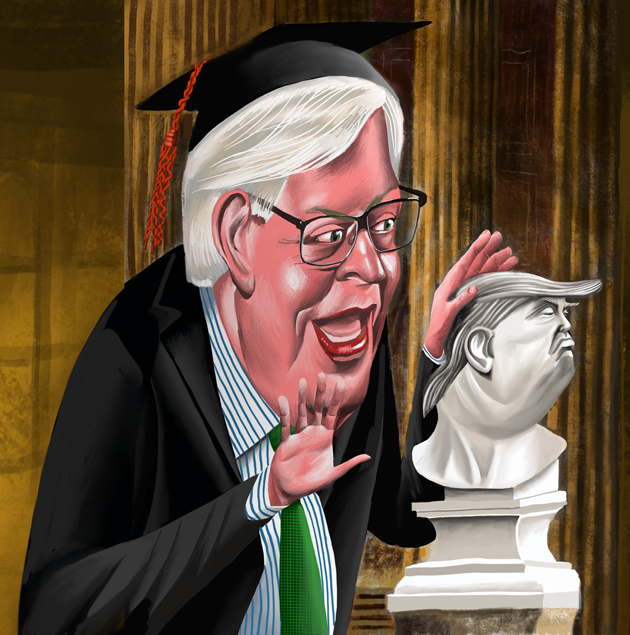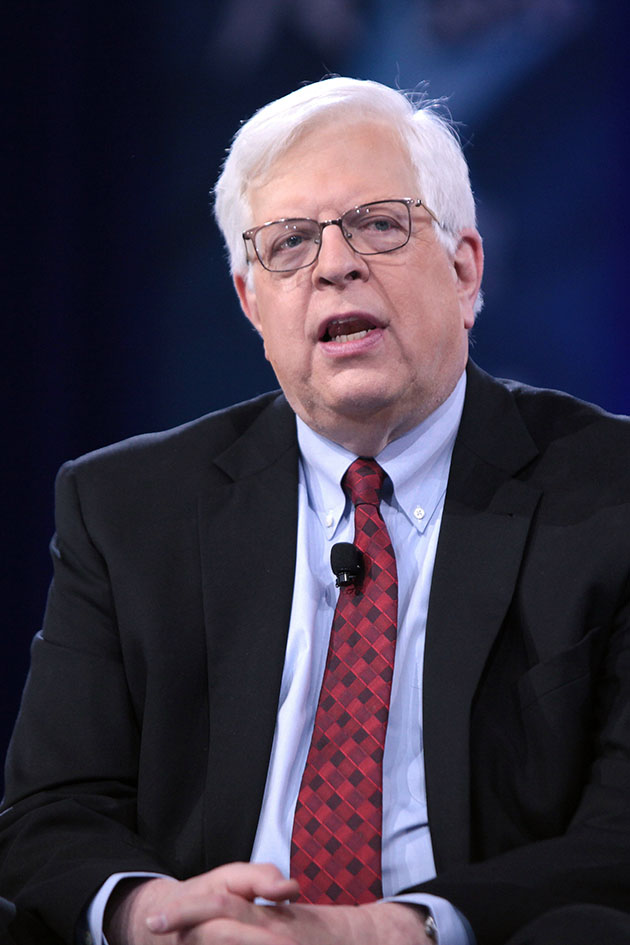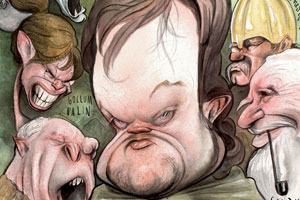
In the weeks after Donald Trump was elected president, Americans flocked to the internet with pressing questions. Some inquired about immigration to Canada. Others Googled “sanctuary city.” A few wanted to know what a “manafort” was. And millions were newly curious about the Electoral College, which for the second time in recent memory was going to contravene the will of the majority. What was it? Why was it? Could electors defy their voters’ wishes?
People turned to the New York Times and the Washington Post, Fox News, and even the Constitution for answers. But few sources were as widely consulted as “Do You Understand the Electoral College?” a five-minute video hosted by retired lawyer and television pundit Tara Ross. Her genial lecture, illustrated with colorful cartoons and pop-up text—”pure democracies do not work”—can be found at Prager University, an online video portal curated by the conservative talk-radio host Dennis Prager. The Electoral College video had about 850,000 views before the election, says Allen Estrin, Prager’s producer and consigliere. “Two weeks later, it had 50 million.”
The intellectual quality of Ross’ video is decidedly junior varsity. She doesn’t mention how the Electoral College was born of a compromise with slave states or note the degree to which it skews the will of the majority—for example, by effectively giving a Wyoming resident’s vote almost quadruple the power of a Californian’s. She also claims (bizarrely) that the Electoral College thwarts voter fraud. But never mind any of that. The video is short and memorable, with quick cuts, zippy graphics, and cool sound effects. It sucks you in.
Since 2012, PragerU has posted nearly 300 similarly digestible videos. Some of them dabble in topics like parenting or financial advice, but most cover core conservative doctrines. Delivering tidy arguments without the Limbaughesque acid reflux, they have accrued, collectively, just over 1 billion views—nearly 700 million in 2017 alone, according to marketing director Craig Strazzeri.
At PragerU, police are not biased against black men, and man-made climate change is debatable. You’ll find takes on animal rights (against), the $15 minimum wage (against), the gender wage gap (doesn’t exist), and why the South turned Republican (nothing to do with race). Prager has hosted a few dozen videos himself, including “Just Say ‘Merry Christmas,'” his take on the “war on Christmas” genre, and “He Wants You,” an apologia for men who ogle women. He personally approves every item, edits every script, and courts “faculty,” including heavy hitters such as Dinesh D’Souza, Steve Forbes, and former White House press secretary Dana Perino. Some presenters, like Harvard Law professor Alan Dershowitz, are credentialed. Others, like comedian Adam Carolla, merely speak with the confidence of people who are.
PragerU “students” don’t earn degrees, of course. Yet a dedicated viewer might walk away with the consistently conservative outlook of a charming, curmudgeonly 69-year-old radio personality who lacks the ratings of his blustery peers—the Sean Hannitys and Mark Levins and Alex Joneses—but boasts a more reassuring disposition. Despite his chosen profession and Brooklyn upbringing, Prager is no yeller. He welcomes guests with whom he disagrees and is respectful to all callers. “There was a time there when Dennis Prager and Bill Bennett represented to me what talk radio could become, which would be focusing on ideas and intelligent conversation,” says fellow conservative talker Charlie Sykes, who has guest-hosted Prager’s show.
But in a transformation that surprised even some of his peers, genteel Prager has become a die-hard Trump cheerleader, loyally supporting the president and downplaying his boorish conduct. He even went so far as to root for Roy Moore, the disgraced Senate candidate from Alabama. Prager denies he’s changed. His support for these men is a rational, practical matter, he says. You vote for the guy who votes the way you would—character is secondary.
But his other line of reasoning on the subject is both irrational and apocalyptic: Prager is convinced that at this historical moment—not in 1976 when he voted for Jimmy Carter, nor in 2006 when he was a sanguine Bush supporter, but right now—our society is collapsing, and a liberal Supreme Court nominee could portend the final flood. Last summer, he tweeted that Western media outlets “pose a far greater danger to Western civilization than Russia does.” Prager explained to me that because “the universities have all but shut down, not to mention demonized, nonleft ideas,” and the media “are not far behind,” it is his duty to provide a conservative take “on things that matter—economics, good and evil, America, Israel, religion, God, etc.” His goal is to imbue young people with “the principles on which America was founded,” and to demonstrate “why Western society will not survive the death of Judeo-Christian values.”
These instincts—Prager the Genial Radio Host and Prager the Gloomy Prophet—merge in PragerU, whose videos are too gentle in tone for the Infowars crowd and too conservative for committed liberals. Rather, they are engineered to sway those in the mushy middle, especially young people trying to figure out what they stand for. Prager’s radio show has about 2 million weekly listeners (to Rush Limbaugh’s 14 million), but PragerU’s appeal goes well beyond the graying talk-radio audience. More than 60 percent of its viewers are younger than 35, according to YouTube analytics.
Strazzeri estimates that 100 million individuals—almost one-third of the US population—have watched at least part of a PragerU video via Facebook, where the organization has more than 2.8 million followers. (Overall viewer numbers would be even greater, PragerU contended in a recent lawsuit against YouTube, had that platform not been blocking some PragerU videos as “inappropriate” content.) With his move past talk radio, Prager is making a play for the future, for the generations that aren’t listening to AM in the car, if they even drive. By meeting young people on their own turf—social media, smartphones—and addressing them amiably, Prager manages to deliver conservative thought in a package even Never Trumpers are willing to open.
The spark for PragerU actually came from Estrin, a former screenwriter on TV shows like The Practice and Touched by an Angel. In 2001, Prager hired him to produce his radio program. Seven years later, during a promotional cruise on the Indian Ocean, some of Prager’s listeners approached his lieutenant to suggest that Prager start his own university. Estrin was skeptical. “It was too daunting,” he recalls. But then “I had a revelation that rather than try to build a building, we should do a virtual university.” In a twist on The Great Courses, they would “take the best minds we could find and distill them into five minutes.”
The operation they launched in 2011 was a tax-exempt nonprofit that would showcase weekly “educational” videos, mostly filmed at PragerU’s Los Angeles-area studio. The site now has about 20 employees, Strazzeri told me, with “between 5 and 10” in marketing. Most of its annual budget, about $6 million, is donated, says CEO Marissa Streit—and nearly 40 percent of PragerU’s revenue is from small donors.

Conservative radio talk show host Dennis Prager during the annual American Conservative Union CPAC in 2016
Gage Skidmore/Planet Pix/ZUMA
Among the major contributors are Dan and Farris Wilks, fracking billionaires who want to bring Christianity into public schools. (PragerU’s Educators Program encourages K-12 teachers and college professors to use “our curriculum as a teaching supplement.”) The Lynde and Harry Bradley Foundation, another funder of right-leaning educational initiatives, has given a substantial sum, too.
Prager’s official role is somewhat nebulous. While the website lists him as “president,” he’s not named as an officer on PragerU’s public IRS forms. Streit explains that Prager has no part in the site’s finances and gets paid at a modest rate, less than $100,000 a year, based on the extent of his involvement. In 2015, according to IRS disclosures, Streit and Estrin, who is executive director, each earned about $150,000.
The left also has deployed bite-size videos to sway millennials, albeit with less success. Inequality Media, founded in 2014 by former Labor Secretary Robert Reich and filmmaker Jacob Kornbluth, has produced about 120 shorts, most featuring Reich. The most popular, “Trump and the Press,” has received more than 10 million views. But PragerU’s marketing savvy puts it miles ahead of any ideological competitors. Strazzeri’s team works diligently to sync Prager’s offerings to the news cycle via targeted Facebook and YouTube ad buys. “All our videos are evergreens,” he explains. “Every day we are looking at what is trending, lining up the right videos, and pushing them.”
PragerU also finds strength in diversity, racial and otherwise. Reich’s videos are typically smarter, the production values every bit as high, but if you can’t relate to a septuagenarian white guy, then they probably aren’t for you. PragerU showcases some 130 distinct personalities—”a lot of young presenters and a lot of famous presenters, people young people want to watch regardless of ideology,” Strazzeri says. He cites comedian Carolla, one of America’s top podcasters, and Mike Rowe, the former host of Discovery’s Dirty Jobs, whose satirical college commencement address on PragerU has well over 10 million views. “He is kind of a champion to the blue-collar workers,” Strazzeri says. While both men are in their 50s, they’re the opposite of stuffy. “It’s not to say we don’t use old people,” he adds. “But young people sometimes see an old person [and] don’t like being lectured to.”
PragerU presenters receive a $1,000 stipend, but the bigger payoff may be in publicity and increased book sales. “It was great for me,” says Naomi Schaefer Riley, author of The New Trail of Tears, whose video—a conservative critique of federal aid to Native Americans and of the reservation system, which she says keeps them poor—has gotten nearly 2 million views. “It’s hard doing television and some kinds of radio; you don’t get to get in a word edgewise, let alone make an entire op-ed argument,” she says. PragerU won’t replace higher education, but “to the extent people can watch this instead of talking heads screaming at each other,” she adds, “I think there is a lot to this.”
I visited Prager in Los Angeles with no assurance I could quote him. He had agreed initially only to answer questions by email, but he said I could come see how he operates. He suggested I drop by his studio at 10 a.m. on a Friday for “Happiness Hour,” a weekly feature on his show since 1999.
Prager broadcasts weekdays from 9 a.m. to noon Pacific time. Unlike, say, Limbaugh, his show is guest-driven, but not all his guests are political. One December lineup featured former Trump surrogate Sebastian Gorka followed by a local rabbi. Prager’s second hour every Wednesday is “Male/Female Hour,” covering relationships and differences between the sexes. But “Happiness Hour,” during which he poses questions to callers such as “What is your 90 minutes of happiness?” may be the most Prager thing Prager does. His ability to pivot—after an ad break for Blinds.com or MyPillow—from an hour of defending Trump to an hour of Oprah-lite chatter demonstrates a self-image not of a partisan warrior but rather of a socially ambidextrous everyman: a Jew who’s popular on conservative Christian campuses, an East Coaster gone native in Southern California, a civility maven who thinks our runaway train of a president is terrific. He’s untortured by these contradictions—indeed, he denies they are contradictions. Although he professes that our civilization is in imminent danger, Prager can be disdainful of big policy ideas, as if what matters most are small things, like a hug or a good song.
Prager takes calls during “Happiness Hour,” but mostly he talks, offering innocuous bromides along the lines of “Bad moods should be regarded as bad breath—you have to brush them away.” The day of my visit, he’s clad in shirt and tie, his rangy 6-foot-4 frame occupying a good chunk of the small studio’s real estate. Estrin, similarly dressed, sits across from Prager, juggling production matters. The semiformality, combined with the simplicity of the messages, brings to mind a hangout session with Mr. Rogers—albeit one with the remnants of a Brooklyn accent. “The left is where hatred thrives,” Prager had told the previous hour’s listeners. Now he’s bantering with Austin from Nashville about “learning how to handle disappointment when your expectations aren’t met.” On both topics Prager sounds unflappable yet encouraging, as if surely we all can agree on at least this much!
Before moving out West, Prager attended Yeshivah of Flatbush, an Orthodox Jewish high school in Brooklyn, and then Brooklyn College. In 1976, at age 27, he made his way to LA, where he taught adult Jewish education and met George Green, an executive at the powerhouse talk-radio station KABC. Green thought Prager, with his knowledge and charm, would make a great host for Religion on the Line, a show featuring conversations with different faith leaders. Indeed, Prager was a hit, at one point garnering a 12 share—12 percent of all listeners in the market—in his Sunday time slot. Green was so impressed he gave Prager a daily show that was picked up nationally. Prager now broadcasts on KRLA and writes a syndicated column. He has published seven books, including a children’s guide to the Ten Commandments, and is working on a multivolume commentary on the Torah, the first five books of the Bible.
After “Happiness Hour,” I accompany Prager to Carolla’s nearby offices to tape a promo spot for an upcoming live show. They are an unlikely pair: Prager with his middlebrow bookishness and Carolla, a former co-host of Comedy Central’s The Man Show, with his cocky libertinism, but they’ve bonded over their distaste for political correctness. Besides the occasional shared gig, they are co-producing a documentary about free speech on campus.
Between takes, on the plush sofas of Carolla’s man-cavey digs, Prager informs me, with the rehearsed certainty of a guru who has given this talk many times, that he didn’t leave liberalism—liberalism left him. “My politics are exactly what they were when I was a liberal and a Democrat, but that’s now considered conservative,” he says. Prager seems to think he has the soul of a hawkish Democrat from an era before Roe v. Wade was a battleground issue, and when white people didn’t lose sleep over racial inequality—1960 maybe? When a man could speak his mind without worrying about being politically correct, women expressed little need for feminism, and few people questioned the Judeo-Christian civic order. It’s hard to pin down precisely, but this worldview is key to Prager’s self-image as a non-ideologue—not postpartisan but prepartisan.
Prager will admit to having changed his mind on only one big issue: Ronald Reagan persuaded him that the bigger government is, “the less individual liberty there will be,” he says. And it’s true that Prager’s beef with the left isn’t policy-specific. He’s against gay marriage but isn’t too exercised by it. He’s pro-choice in some cases. He sees nothing wrong with divorce—he’s on his third marriage. (“I’d rather be 1 for 3 than 0 for 2!”) What he deplores is not so much the left as the leftists, chipping away at our confidence in Western civilization.
So many conservatives have made their peace with Trump by now that we’ve come to expect it. But moral rectitude was always central to Prager’s message. In 2011, he wrote that Trump’s repeated uses of the F-word “render him unfit to be a presidential candidate, let alone president.” Early in the primaries, Prager attacked Trump regularly. Now he’s loath to utter a negative word. Asked what he considers the worst aspect of Trump’s presidency, he couldn’t really name one. “If he said what he wants to say in a classy way—in the NPR sort of way in which Obama spoke—and didn’t make me cringe on occasion, I’d be happier,” he told me. “But if he spoke like NPR, he would probably care what NPR said about him, and then he wouldn’t be effective.”
Conor Friedersdorf, a staff writer at The Atlantic who tracks conservative talk radio, is baffled by Prager’s shift. “Dennis Prager is smarter than Sean Hannity,” Friedersdorf says. “He is less insecure than Rush Limbaugh, and he is more civil than Mark Levin. In fact, his commitment to civility and reasoned discourse distinguishes him from other talk-radio hosts in tone and substance.” But Prager’s Trump enthusiasm makes Friedersdorf wonder, “Does he really believe in those things, or is he ultimately just another partisan Republican or anti-leftist who will pull the lever next to ‘R’ and support the Republican president rhetorically for that reason?”
“I think he got caught up in this notion that all politics is this ultimate binary choice, this belief that the left was poised to destroy America,” says Sykes, Prager’s occasional guest host. “As someone who has dealt so seriously with ethical issues—and he is a serious ethicist, I think—that came as a real shock to me.”
If Prager’s goal is, as Sykes suggests, to save America, is he succeeding? The billion views, the 100 million Facebook uniques—what do these numbers mean?
It’s hard to say. PragerU’s most recent polling, of nearly 3,000 Facebook followers, suggests the videos are effective, Strazzeri says: “70 percent of people who have seen a Prager video changed their minds on an issue.” That’s a self-selecting sample, though. In one of the site’s “What We Do” videos, a spokesman who wouldn’t look out of place in a boy band claims that “we” are “building a counterculture, with an impact on millions of people every day,” but the Twitteresque testimonials he cites have generic handles like @Lucy943 that lead to dormant Twitter accounts. Another PragerU pitchwoman boasts that “Tom, the former head of the Stanford College Democrats,” resigned after binge-watching PragerU videos. I couldn’t verify Tom’s existence, nor would PragerU put me in touch.
Canned testimonials aside, I don’t doubt PragerU’s videos are changing minds. Most of us are fairly ignorant about most things, so what happens when our outlook on a subject is based largely on one slick, accessible video? Knowing little about Native American politics, I found Naomi Schaefer Riley’s argument—that American Indian poverty is largely the fault of well-meaning government overreach—pretty persuasive. I’m sure there’s another side, but what if fact-checking her thesis isn’t high on my priority list?
The formula is simple enough—a broad range of presenters and topics, a consistent supply of new product, aggressive promotion—but Estrin thinks the real key is brevity. He’s seen the liberal academics natter away in lecture-hall videos, taking for granted that busy people will sacrifice an hour to absorb their views on economics or Plato. Even the YouTube videos in the popular Crash Course series are 10 to 12 minutes—too long. “In the world of the internet, five minutes is the right dosage,” Estrin says. “You can’t get calculus across, but you can get a lot in politics, history, a lot of things.”
It’s not like the left couldn’t do something similar. It might feature Reich, but also, say, Sarah Silverman, Neil deGrasse Tyson, and America Ferrera. PragerU views sites like BuzzFeed, Vice, and Al Jazeera’s AJ+ as left-wing competition, but in fact liberals have never mounted such an ambitious, ideologically targeted effort to win over young people. And Estrin is surprised. “I keep waiting for that to happen,” he says. “I have every confidence it will.”
















